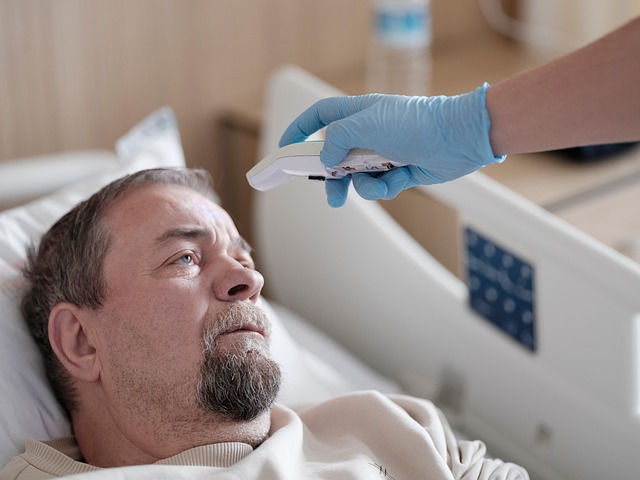Online Workshops: Empowering Addiction Recovery Through Self-Compassion and Relaxation

Online self-help resources for addiction recovery provide accessible tools and support for holistic…….
Over 15% US adults have used prescription painkillers not prescribed to them.
In today’s digital age, online self-help resources have emerged as a powerful tool in the global effort to combat addiction and support recovery. This comprehensive article delves into the world of online tools, platforms, and communities dedicated to aiding individuals on their journey towards overcoming substance abuse or addictive behaviors. By exploring various aspects, from technological advancements to policy frameworks, we aim to provide a holistic understanding of this growing field. Readers will gain insights into the effectiveness, accessibility, and challenges associated with these resources, ultimately highlighting their potential impact on mental health and wellness worldwide.
Definition: Online self-help resources for addiction recovery refer to digital platforms, applications, and communities designed to assist individuals in their journey towards recovering from substance use disorders (SUDs), behavioral addictions, or other forms of addictive behaviors. These resources offer a wide range of tools, including educational content, support groups, counseling services, and tracking tools, all accessible via the internet.
Core Components:
Educational Resources: Online platforms provide access to information on various addiction-related topics, such as understanding addiction, withdrawal symptoms, treatment options, and recovery strategies. These resources often include articles, videos, and interactive modules designed to educate users about their condition.
Support Groups: Virtual support groups facilitate peer-to-peer connections, allowing individuals to share experiences, struggles, and successes with others facing similar challenges. These groups operate through forums, chat rooms, or video conferencing platforms, providing a sense of community and solidarity.
Online Counseling and Therapy: Many resources offer one-on-one counseling sessions with licensed therapists or trained professionals via video calls, live chat, or messaging systems. This provides accessibility for individuals who may not have access to traditional in-person therapy services.
Tracking and Monitoring Tools: Users can employ apps or software to track their progress, set goals, monitor triggers, and record achievements related to their recovery journey. These tools help individuals stay accountable and gain insights into their behaviors.
Historical Context: The concept of online self-help resources for addiction recovery has evolved significantly over the past two decades. Initially, early internet forums and message boards served as platforms for individuals to share experiences and support one another. As technology advanced, specialized apps and websites started emerging, incorporating interactive features and evidence-based practices. The rise of mobile applications in particular has made these resources more accessible and user-friendly, allowing individuals to access support on-the-go.
The reach and impact of online self-help resources for addiction recovery are profound, transcending geographical boundaries and cultural barriers. Key trends shaping this field include:
Digital Integration in Healthcare: Many countries are integrating digital health solutions into their healthcare systems, recognizing the benefits of remote support and monitoring for mental health conditions and addictions. This shift has opened doors for online self-help resources to gain recognition as valid treatment options.
Growing Awareness and Stigma Reduction: Online platforms play a significant role in raising awareness about addiction, its causes, and available treatment options. By providing accessible information, these resources contribute to reducing the stigma associated with seeking help, encouraging more individuals to consider recovery.
Cultural Adaptation: As online self-help tools become global phenomena, they undergo cultural adaptation to suit diverse populations. This involves translating content, incorporating culturally relevant themes, and addressing specific challenges faced by different communities, ensuring their effectiveness across various regions.
Mobile Dominance: The proliferation of smartphones has led to a surge in the use of mobile applications for addiction recovery support. According to a 2021 report by Statista, the global market size for digital health apps reached $35.4 billion, with a significant portion dedicated to mental health and wellness applications.
The economic landscape surrounding online self-help resources for addiction recovery is dynamic and multifaceted.
Market Dynamics: The global digital health market, including online addiction recovery services, is projected to grow exponentially in the coming years. This growth is driven by increasing demand, advancements in technology, and expanding healthcare systems that embrace digital solutions. A report by Grand View Research estimates the global digital health market size at $345 billion in 2021, with a CAGR of 23.7% from 2022 to 2030.
Investment Patterns: Venture capital firms and angel investors have shown significant interest in online self-help startups, recognizing their potential impact on healthcare and wellness. According to CB Insights, health tech startups received $14.5 billion in venture capital funding in 2021, with a notable focus on mental health and digital therapy solutions.
Cost-Effectiveness: Online resources often offer more affordable treatment options compared to traditional face-to-face counseling or rehab programs. This cost-effectiveness is particularly advantageous for individuals with limited financial resources or those seeking complementary treatments alongside professional help.
Technological innovations have played a pivotal role in shaping and enhancing online self-help resources for addiction recovery. Notable advancements include:
Artificial Intelligence (AI): AI-powered chatbots and virtual assistants are being integrated into these platforms, providing personalized support and guidance to users. These tools can offer immediate assistance, answer frequently asked questions, and even refer individuals to appropriate resources or professionals when needed.
Virtual Reality (VR) Therapy: VR technology creates immersive experiences that simulate real-life scenarios, helping individuals confront triggers and practice coping strategies in a controlled environment. This approach has shown promise in treating phobias, anxiety, and post-traumatic stress disorder (PTSD), which are often comorbid with addiction.
Wearable Devices: Smartwatches and fitness trackers can be utilized for remote monitoring of vital signs, sleep patterns, and physical activity levels, providing valuable data to individuals and their support teams. These devices also offer gentle reminders and motivational messages to encourage adherence to recovery plans.
Blockchain and Crypto Therapy Tokens: Blockchain technology is being explored for its potential in securing user data, ensuring privacy, and creating tokenized systems of reward or incentives for active participation in recovery programs. Crypto therapy tokens could revolutionize the way users access and pay for online services, promoting engagement and sustainability.
The regulatory landscape surrounding online self-help resources for addiction recovery is complex and varies across jurisdictions. Key policies and regulations include:
Data Privacy Laws: Given the sensitive nature of user information, data privacy laws like GDPR in Europe, CCPA in California, and HIPAA in the US ensure that online platforms protect user data and maintain secure communication channels. Compliance with these regulations is crucial for providers to build trust with their users.
Health Insurance Coverage: Many countries are updating their health insurance policies to include coverage for digital mental health services, including online therapy and recovery support. This ensures accessibility and affordability for individuals seeking help through these platforms.
Telehealth Regulations: The legal framework around telehealth and remote counseling practices varies worldwide. Regulators must address issues such as licensing, provider authentication, and patient consent to ensure the quality and safety of online healthcare services.
Addiction Treatment Guidelines: Professional organizations and regulatory bodies are developing guidelines for the use of digital tools in addiction treatment. These guidelines help ensure that online resources align with evidence-based practices and contribute to effective recovery outcomes.
Despite its potential, online self-help resources for addiction recovery faces several challenges and criticisms:
Digital Divide: Access to technology and reliable internet connections is not uniform across all demographics. Individuals from lower socioeconomic backgrounds or rural areas may face barriers in utilizing these resources, exacerbating existing health disparities.
Regulation and Quality Assurance: Ensuring the quality and efficacy of online programs remains a challenge. Self-regulation by platforms and lack of standardized measures for evaluation can lead to inconsistent outcomes. Robust regulatory frameworks are needed to address these concerns.
Privacy and Security: Protecting user data is paramount, especially considering the sensitive nature of addiction recovery information. Data breaches or unauthorized access could have severe consequences for individuals and their support networks.
Ethical Concerns: Online platforms must navigate ethical dilemmas, such as consent for data collection, informed decision-making regarding treatment recommendations, and potential harm from digital interventions. Transparent practices and user-centric design are essential to building trust.
To address the identified challenges, several strategies can be implemented:
Bridge the Digital Divide: Governments and healthcare providers should invest in expanding internet accessibility and providing affordable devices to underserved populations. Community outreach programs can also help educate individuals on using online resources effectively.
Develop Standardized Protocols: Collaboration between industry stakeholders, researchers, and regulatory bodies is necessary to establish standardized protocols for evaluating and regulating online addiction recovery services. This ensures quality and consistency in program delivery.
Enhance Data Security: Implementing robust cybersecurity measures, including encryption and secure data storage, is crucial. Platforms should also be transparent about their data handling practices and obtain explicit user consent.
Promote Ethical Practices: Online self-help resources should prioritize ethical considerations, such as providing clear information about limitations, obtaining informed consent, and ensuring user privacy. Collaborative efforts between developers, therapists, and ethicists can help establish best practices.
SMART Recovery, a leading global organization in self-management for addiction, offers an extensive online program. Their platform provides access to evidence-based tools, including self-help videos, workshops, and peer support forums. By 2022, SMART Recovery reported over 500,000 registered members worldwide, with nearly 1 million forum posts exchanged. This success lies in their tailored approach, catering to various addictions and offering a supportive community for ongoing recovery.
ReThink is a digital health company based in the UK, offering an app-based program for alcohol dependence. Their evidence-based approach combines cognitive behavioral therapy (CBT), mindfulness exercises, and social support to aid users in reducing alcohol consumption. A study published in the Journal of Medical Internet Research (2020) reported significant reductions in alcohol intake among participants using the ReThink app compared to a control group. The program’s success demonstrates the potential of digital interventions in treating substance use disorders.
SAFER (Substance Abuse and Mental Health Services Research Institute) developed an online platform for teens at risk of substance abuse. This platform offers interactive modules, videos, and games to educate youth about addiction and provide tools for stress management and healthy decision-making. A pilot study showed promising results, with participants demonstrating improved knowledge and reduced substance use intentions. SAFER’s approach targets a critical population, offering early intervention and prevention strategies.
The future of online self-help resources for addiction recovery is filled with potential growth areas and emerging trends:
Personalized Treatment: Advanced AI algorithms will enable more personalized treatment plans, tailored to individual needs and preferences. This approach can enhance engagement and improve outcomes by providing relevant and meaningful content.
Integration with Wearable Technology: The synergy between wearable devices and online platforms will offer a holistic view of an individual’s physical and mental health. This integration could lead to more precise interventions and improved recovery tracking.
Virtual Reality as a Therapeutic Tool: VR technology will continue to evolve, providing immersive experiences that simulate real-life scenarios related to addiction triggers and recovery challenges. As the technology matures, its applications in therapy will expand.
Global Expansion and Cultural Adaptation: Online resources are poised for global expansion, with increased focus on cultural adaptation to cater to diverse populations. This ensures relevance and effectiveness across various regions, addressing unique cultural aspects of addiction and recovery.
Regulatory Clarity and Collaboration: As the field matures, regulatory bodies will establish clearer guidelines, fostering collaboration between technology developers, healthcare providers, and researchers. This partnership will drive innovation while ensuring safety and quality in online addiction recovery services.
Online self-help resources for addiction recovery have emerged as a powerful ally in the global effort to combat addictive behaviors and support individuals on their path to recovery. This comprehensive overview has highlighted the many facets of this dynamic field, from technological advancements to policy considerations. By providing accessible information, peer support, and evidence-based tools, these resources offer hope and help to those struggling with addiction.
As technology continues to evolve and regulatory frameworks adapt, the potential for online self-help to revolutionize addiction recovery will only grow. With continued research, innovation, and collaboration, these digital tools can play a pivotal role in transforming mental health care worldwide, ensuring that support is readily available to all who need it.
Q: Are online self-help resources effective for addiction recovery?
A: Numerous studies and real-world examples demonstrate the effectiveness of online resources. They offer accessible, convenient, and often cost-effective alternatives to traditional treatment methods. However, like any approach, their success depends on individual engagement, commitment, and complementing other forms of support when needed.
Q: How do I choose a reliable online addiction recovery program?
A: Look for reputable platforms backed by research or partnerships with healthcare organizations. Read user reviews, check for data security measures, and ensure the program aligns with evidence-based practices. Verify if professionals are involved in designing or overseeing the content.
Q: Can online resources replace traditional therapy or support groups?
A: While online self-help tools can be highly beneficial, they may not fully replace face-to-face therapy or support groups for everyone. In-person interactions offer unique benefits, such as immediate feedback and social connection. However, many individuals find that combining online resources with traditional treatments enhances their recovery journey.
Q: Are there any risks associated with using these online services?
A: As with any digital solution, there are potential risks. Data privacy and security concerns exist, so users should be cautious about sharing personal information. Additionally, some platforms may provide inaccurate or misleading content. It’s essential to approach online resources critically and seek professional help when necessary.
Q: How do I know if I or a loved one needs professional help for addiction?
A: Recognizing the signs of addiction is crucial. These may include loss of control over substance use, increased tolerance, negative consequences on relationships or work, and continuing to use despite harmful effects. If you notice these or similar behaviors, consider reaching out to a healthcare provider or mental health professional for guidance.

Online self-help resources for addiction recovery provide accessible tools and support for holistic…….

Withdrawal symptoms and emotional challenges pose significant hurdles to early sobriety. Online self…….

Meditation, especially through online self-help resources for addiction recovery, is a powerful tool…….

Nutrition planning is a key component in addiction recovery, combining physical and mental health so…….

Relapse prevention, powered by online self-help resources, is a proactive approach to addiction reco…….